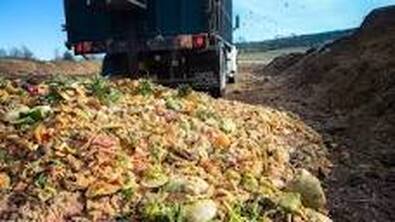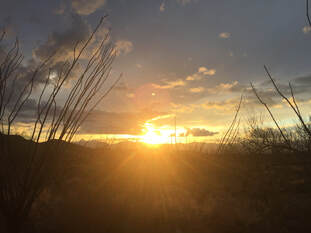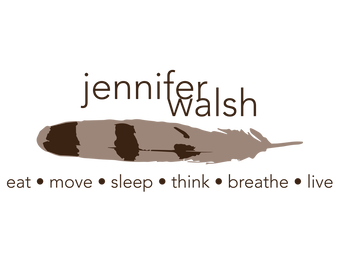|
Tis the season — for desert harvesting. Recently Mateo and I ventured into our backyard to collect cholla flower buds just before they bloom.
The experience’s rewards went far beyond the gathered food. This tradition, gifted by the indigenous people of this region, can bring magical connections:to the land; to your food; to Native tradition; to the warming season; and to those you harvest with. While it’s no secret I am a proponent for sustainable living, far too often I will succumb to “quick and easy” and tear open a bag of something store-bought and processed to eat. While it might curb my hunger, it doesn't satisfy my soul. It is a very different experience to collect wild, abundant food from the area in which I live. Throughout the cholla harvest I was engaged on a mental, physical, and even spiritual level. From carefully choosing buds and being mindful not to take too many from any one plant; to feeling the weight of the bucket I carried grow heavy under the warm sun; to building a screen to de-spine the buds; to vigorously shaking the buds over the screen and watching the spines rain down; to carefully cleaning and admiring the unique beauty of each bud; to learning how best to preserve our bounty; and to finally cooking and eating them with my Sweetie. Effort, awe, and gratitude were ever present. I also found myself considering the differences between grown foods and wild foods: plants and animals nourishing themselves for survival, as opposed to being cared for. Could all the energy, wisdom, and fighting spirit it takes to survive and thrive as a wild plant be transmitted through the buds we collected? I believe so! Cholla bud flower-power provides a rich amount of calcium and lysine. And the mucilaginous nature of this cacti helps slow the absorption of sugar into the blood making them an effective slow-carb source of energy. The overall experience was a bit of a reality check as well. What if our daily routine included the necessity of harvesting our foods in order to have the gift and luxury of getting to cook? This thought and our experience has left me more mindful of the resources that have gone into a food before it makes it to my mouth. I’m inspired to continue to reduce my consumption of foods that place an unnecessary burden on our planet for my benefit. I recognize I can’t live on the bucket of cholla buds we collected, but I can incorporate them into my diet and choose wisely the foods I purchase that are grown and processed by others. I encourage you to do the same! To learn more about how exactly to harvest and process cholla buds check out @aztmateo’s April 27 post on Instagram.
0 Comments
 One of the easiest ways to reduce your carbon footprint is to NOT WASTE FOOD. Did you know, up to 40% of food in the United States doesn’t get eaten? Globally, an estimated 1/3 of all food is either lost or wasted. Consider ALL the natural and human resources required to grow, raise, harvest, and transport your food! Below are some tips to help you reduce food waste. 1. Cook and eat the oldest fresh foods you have FIRST to avoid things going bad. 2. Befriend your freezer. Freezing food is an excellent way to save produce from going bad as well as preserve nutrients and have a go-to meal available when you want it most. Properly store fresh foods so they last longer in the refrigerator. 3. Buy fresh lettuce and greens instead of pre-washed and bagged items. These ALWAY go bad faster and uses packaging that just ends up in the landfill! 4. Restaurant portions too big? Take leftovers when eating out and eat them for lunch the next day. Use leftovers and food scraps to make stock broth. 5. Pack it or donate it. Holidays and monumental occasions (think weddings) can be notorious for food waste. If you happen to be hosting a gathering, consider getting the food packed for friends and family or contacting a local organization that collects leftover food for donation. 6. Get into the habit of “going through the refrigerator” at least weekly to stay on top of what needs to be eaten, and so you don’t over buy when you go to the market. 7. Think twice about what you order out… how hungry are you? Don’t want the bread? Ask them NOT to bring it to the table. Not hungry for a full meal? Consider ordering items a-la-carte or sharing your meal with someone at the table. 8. Talk about the importance of not wasting food with your children to raise their awareness too!  Tip: read this while listening to Eminem’s song Lose Yourself ) Seize this opportunity my friends. We’ve been handed an opportunity to decide if we want to go back to “normal” once we return to living outside of quarantine. While we are all adapting to life during the Coronavirus pandemic, I see a profound opportunity. What part of your “normal” are you realizing you no longer need or perhaps could do differently? What part of your life in quarantine has been a blessing and how can you bring those blessings into your daily life outside of quarantine? And how could the changes you make affect your loved ones; society; and the planet? There is much suffering happening right now that arguably could have been prevented, to at least some degree. Let’s not let the suffering be in vain. Let’s collectively use this opportunity to reflect, assess, revise, and enact a new and better “normal.” I see the potential for a new normal centered on taking care of our bodies and minds; taking care of our families and neighbors; making more selfless not self-centered choices; not shopping for crap we don’t need or could borrow instead of buying; spending time in nature and valuing the benefits to the degree that makes protecting the planet a priority in every choice; and being honest with ourselves and others no matter how difficult that may be. This is perhaps our "one shot." Let's not let it slip! Eminem's Lose Yourself Lyrics.. Look If you had One shot Or one opportunity To seize everything you ever wanted In one moment Would you capture it Or just let it slip?… |
|
PAGES
|
SOCIAL
|
|
415.378.4689
|
Copyright © 2021 Jennifer Walsh
 RSS Feed
RSS Feed
